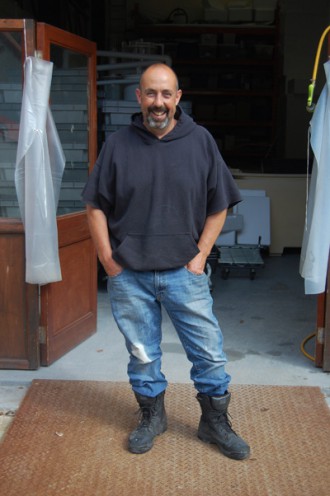Digitally direct
A champion of responsible fishing, Saul Astrinsky is another forward-thinking Cornish fishermen going direct with his family-run Wild Harbour Fish Company in Hayle.
Knowledgeable, friendly and passionate about what he does, Saul got hooked on fishing when he was a boy, catching trout in the river that ran through the garden. He’s been fishing commercially for around 25 years now. He’s also a champion of the Responsible Fishing Scheme, introduced by Seafish to raise standards in the catching sector, as he explains in the video below.
Realising that fishing is too demanding a job to do forever, and frustrated by what he calls the “lottery” of market prices, his company now buys fish from partner boats and sells it direct to eager buyers “all over”, including London fishmongers, and various local restaurants such as Nathan Outlaw, the Gurnard’s Head, Rick Stein’s Seafood Restaurant, Ben’s Cornish Kitchen and the Porthminster Café in St Ives. He’ll even send out custom fish boxes to the general public anywhere in the UK.
“We buy off about 16 boats now,” he says. “We’re all good mates. I pay them a fair price, which is set and agreed for the season, so everyone knows what they’re going to get.” That’s very different to the way things usually work, he explains. “When you land 50 stone mackerel on the market, for example, some times you’ll get 50p a kilo, some days £3 a kilo. I give my customers a set price for the season too. Chefs like that because it means they don’t have to change the price on the menu every day.”
Saul’s partner boats use a mix of rod and line, handlines and lobster pots (you can find out more about who they are and how they fish on Saul’s neat website). Every day, he also sends out an update via text, email and Twitter to say what the boats are going out for and what they’ve caught – a handy up-to-the-minute guide to what’s in season in Cornwall’s rich waters.
At the end of January, they’re just coming to the end of bass and pollack, he says. “February and March are quiet, because the fish are breeding. It starts again in April and May, when we’ll start catching pollack and bass again. But it all depends on the water temperature – if it’s less than 9 degrees bass won’t feed, so one degree can be critical. Mackerel can be here all year round, on and off. Cod was good a couple of years ago, but it seems to have gone again now. We have a nice squid fishery from September to around Christmas and lobsters and crab from April to Christmas too.”
As for his business, “it’s getting busier all the time,” he says. “We can send away two tonnes of fish in a very good week, all caught with a line – that’s a lot. People are definitely coming on board with the whole sustainability and traceability thing. And once they’ve seen our fish they won’t go back.”
It’s hard work, though. “It can be horrible!” he admits. “If I go pollacking, I’m working 18- to 20-hour days. Last week, I got up at 2.45am and got in at 10pm. Some times, you get beaten up by the weather and don’t even cover your fuel. Other days you go out 20 miles or so, and just as first light breaks you get a lovely shoal of pollack and catch a grand’s worth. And that’s a special day. But bass is my love. My best catch was 130 in a day – unbelievable. That’s what makes it all worthwhile.”






